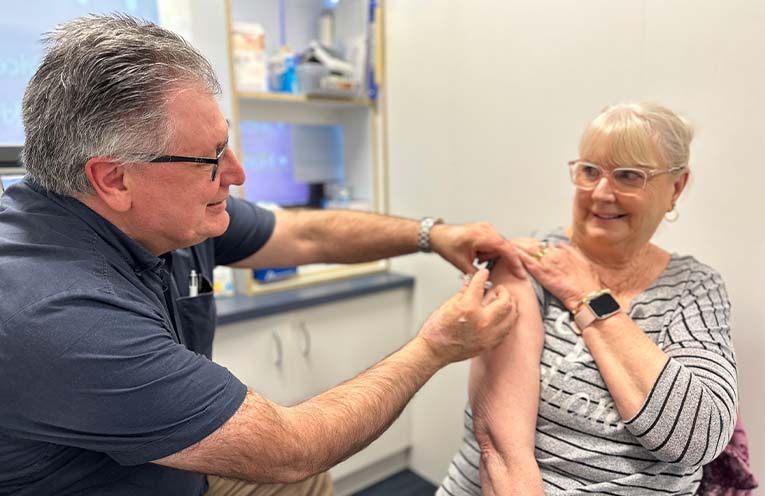
NORTH Haven pharmacist David Miles believes vaccine burn-out and disinformation could be factors in the low number of locals getting their yearly influenza vaccination.
This is despite NSW Health data showing flu cases are surging.
“There’s a lot of disinformation out there, and people can’t differentiate the facts anymore,” Mr Miles said.
The Mid North Coast Local Health District (MNCLHD) is urging the elderly and vulnerable in particular to book-in to see their GP or pharmacist for a flu shot.
“Unfortunately our vaccination rates for this group still aren’t where we need them to be,” said Dr Valerie Delpec, the Director of the North Coast Population and Public Health Unit.
“Flu is rapidly increasing. In the past week alone, presentations to NSW emergency departments increased by almost 22 percent for people with influenza-like illness.”
Janice Locke of Laurieton gets a flu shot every year, although she says she was a little late this season.
Her husband opted to receive his through his local GP.
As is the case with everyone aged 65 and older, their vaccinations were free.
Also covered are children between six months to five-years-old; pregnant women; and those with serious health conditions such as diabetes, cancer, immune disorders, severe asthma, kidney, heart and lung disease.
Mr Miles knows first-hand that there are “plenty of people” in the Camden Haven with flu symptoms.
“But as far as what we’re seeing, there seems to be more COVID,” he said.
“Fortunately we’ve got the new RATs (Rapid Antigen Tests) to check for COVID-19 and Influenza A and B.”
NSW Health’s latest Respiratory Surveillance Report shows the elderly have the highest rates of COVID notifications.
It also notes that pertussis and pneumonia are unseasonably high in school aged children.
The MNCLHD is reminding community members to avoid high-risk settings such as hospitals and aged care facilities if they are showing any signs of respiratory viruses such as influenza, COVID-19 or RSV.
It also recommends taking the following steps to protect yourself and others.
• Stay up to date with your recommended vaccinations
• Stay home if you are sick and wear a mask if you need to leave home
• Get together outdoors or in large, well-ventilated spaces with open doors and windows
• Avoid crowded spaces
• Consider doing a rapid antigen test (RAT) before visiting people at higher risk of severe illness
• Talk with your doctor now if you are at higher risk of severe illness from COVID-19 or influenza to make a plan about what to do if you get sick, including what test to take, and discussing if you are eligible for antiviral medicines
• Don’t visit people who are at higher risk of severe illness if you are sick or have tested positive to COVID-19 or influenza
• Practice good hand hygiene, including handwashing.
By Sue STEPHENSON